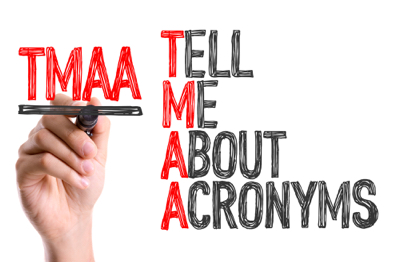How to Use Acronyms in Academic Essay Writing

As a college student, you write your fair share of essays, and over time it can become rather boring to write out the same words over and over again. As more and more students see texting as their primary form of written expression, it can be tempting to revert to “text-speak” as you write your essays, shortening words and turning toward acronyms and abbreviations to plow through your writing faster. However, most text-speak isn’t appropriate for college-level writing, and it is important to understand when and where acronyms an be used in academic writing. In this article, we’ll talk a bit about acronyms and discuss when it’s OK to use them, and when you should spell out what you mean.
What Is an Acronym?
There are many different types of abbreviations, and not all of them are acronyms. Any shortening of a word can be considered an abbreviation. However, an acronym is a very specific type of abbreviation. An acronym is formed from the initial letters of the word that it is abbreviating, and those letters have to be pronounced as a word on their own. So, for example, UNESCO is an acronym because it is formed from the first letters of United Nations Educational, Scientific and Cultural Organization and is pronounced as a word—You-NESS-Co—rather than letter by letter. By contrast, FBI is not an acronym because the first letters of Federal Bureau of Investigation are sounded out individually—EFF-Bee-Eye—rather than pronounced as a word. This type of abbreviation is called an “initialism.”
Another class of abbreviations are pseudo-acronyms, which look like acronyms but are simply a series of letters designed to sound like the original word while saving space, such as BBQ for “barbecue.” These are not true acronyms but function much like them.
When to Use Abbreviations
Initialisms and acronyms can be used in academic essay writing in limited circumstances. The general rule of thumb is that you spell out an acronym on first reference and then use the acronym after that. What that means is that the first time you make reference to, say, OSHA, you would write “Occupational Safety and Health Administration” and then use OSHA in subsequent sentences. Do not place the acronym in parentheses after the initial reference. Readers can be trusted to recognize it.
There are exceptions to this rule for well-known acronyms or initialisms and for those that are better-known than the words they abbreviate. For example, FBI does not generally need to be identified before using the initialism, and today “laser” and “scuba” are probably better known than the words they abbreviate, “light amplification by stimulated emission of radiation” and “self-contained underwater breathing apparatus,” respectively. Indeed, the acronyms are so much more widely used that giving the original words would probably confuse many readers who don’t know what the acronym stands for.
When to Avoid Acronyms
Acronyms can be helpful in speeding up the writing process and the flow of writing, but they shouldn’t overwhelm your paper to the point that it looks like alphabet soup, nor should acronyms ever confuse the reader. Generally speaking, acronyms are helpful when the abbreviation is common or when one has been introduced and will be used frequently in a paper. However, if you are referring to an unfamiliar phrase only once or twice in a paper, it’s more confusing to make the reader go back and learn a new acronym for a single reference than it is to simply spell out the term or refer to it in a different way. Always keep the reader in mind and consider whether the use of an acronym will help the reader gain information faster or whether it will cause unnecessary confusion.
Overall, acronyms can be useful when deployed strategically to enhance the content of the essay. If you struggle with the use of acronyms, an essay writing service can show you the right way to use abbreviations of all kinds to effectively develop your essay without turning it into a sea of unexplained capital letters. Professional writers work with abbreviations and acronyms all the time, and they know the right way to explain them to readers so they are always clear and enhance rather than detract from the excellent work your essay is doing.
